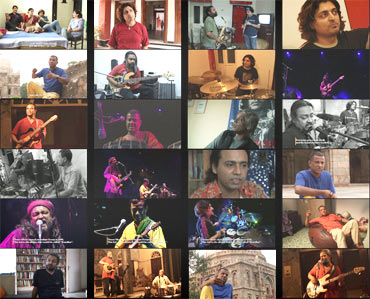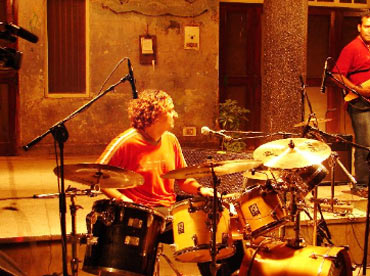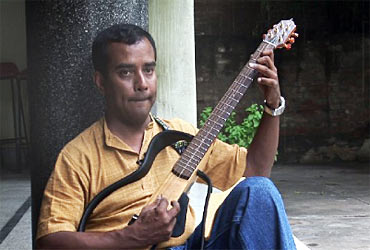 | « Back to article | Print this article |
Looking at the Indian Ocean journey
When Asheem Chakravarthy, Indian Ocean's gifted percussionist, passed away recently following a massive heart attack, it was a shocking blow for fans of the band.
Among them was Jaideep Varma, a New Delhi-based writer and filmmaker. Back in 2006, when he had met Chakravarty -- and the other members of Indian Ocean -- Varma had decided to enter uncharted waters with a first-of-its-kind film that would explore the life and times of Indian Ocean.
"No one believed in the film more than him -- it would have made him so happy to see this happen," says Varma softly, adding that Chakravarty was the only one of the four band members who resolutely believed in this big-screen release day.
The film, Leaving Home: The Life and Music of Indian Ocean, is set to release on April 3. What's more, for the very first time in Indian cinema, a full-length feature film has tried to piece together the story of a music band.
Why Indian Ocean?
Interestingly, the answers are not hard to find. After all, there's a generation of music-lovers who remember listening to Indian Ocean's distinctive songs in the early days in hostel rooms over a glass of beer, or waiting eagerly for a date with the band at various annual college fests or at performances all over the country.
Musicians like Rabbi Shergill say that "beyond Indian Ocean, I don't see anyone... I see brown-wannabe whites".
Varma, who used to write a music column for Gentleman magazine, admits that he had always wanted to do something unique with Indian Ocean, given that he was familiar with their music as well as the members personally.
'I decided that Asheem's demise will not change anything'
Varma recalls Chakravarty's tremendous involvement with the project.
"The interviews we did with him were very special as he put himself on the line repeatedly -- with the same commitment that he had for his music."
The other three members of the band -- Rahul Ram, Susmit Sen and Amit Kilam, "also allowed me to reach out for something through the film," he says.
Asheem's unfortunate demise was a blow, but that didn't change the course of the film at all.
"I made the decision to not change it in any way," says Varma, "because Leaving Home was always meant to be a celebration of their music and lives -- I did not want that basic approach to be affected -- Asheem would not have wanted it either."
When asked about the difficulties he faced while making the film, Varma chuckles out loud and says, "There have been only difficulties and all major. Basically no one seems to know what to do with a film of this nature as there has been no precedent. And most people in this business mask their cluelessness with arrogance, so I have been laughed out of many a room over the last three years."
The idea actually came to him in 2006, when he was in a position to set up a small entertainment project within a small budget. There wasn't even time to do the kind of research he wanted.
"We had to start within a couple of weeks of my proposing the project as they were going to be touring after that."
He still recalls band member Rahul Ram's comment that broke the stunned silence following his announcement about the absurdly low budget for the film -- "Indian Ocean has always done things against the odds, chalo, this is one more."
'Leaving Home was ready but no one to release until Big Cinemas offered to release it'
The lives of the four band members are traced through extensive interviews with them, their family members, people they have worked with, including Anurag Kashyap, Nandita Das, Shubha Mudgal, Prannoy Roy, Sudhir Mishra and many others.
Most of the movie was completed in 2006 and early 2007 and was shot in three schedules for about 50 days or so.
Indian Ocean as a band thrives on live performances and anyone who has been to their concerts will tell you that. For first-time listeners, songs like Kandisa and Ma Rewa are a distinct departure from convention, if convention is indeed a word one could use in the context of music. But they strike a chord.
Varma recalls the terrible Delhi summers, shooting outdoors for long hours, the cheap hotels (which was all that the budget would allow) and the charms of street food.
Yet he confesses that it was all worth it, for the sheer pleasure of telling the tale, capturing the camaraderie and warmth that characterised the jamming sessions, peppered with anecdotes from the band describing the support from Ram's parents and Sen's father, who also gave the band its name, at a time when most parents would worry about their children following an unusual career path.
The real struggle started once the movie was done, as there seemed to be no outlet to release the film. "Leaving Home," says Varma, "was all dressed up with nowhere to go."
But out of nowhere, Big Cinemas came into the picture and offered to release the movie, a very limited release admittedly, but one that suggested that someone had reposed some faith in it.
Now that the release of the movie is round the corner, there is a great sense of excitement and Varma is confident that, unlike distributors, there is definitely an audience for such movies and that the numbers are significant, too.
"There is a lot of enthusiasm to try out new kinds of films, I think." He is hoping that the core audience of the film will support it (this is a small release in the Bollywood scheme of things), because this core audience is made up of the same people who would have first got acquainted with Indian Ocean in hostel rooms, at college festivals and by attending live performances of the fledgling band. First love, as many of us know, is a heady thing.
The beginning
In 1984, Susmit Sen met Asheem Chakravarty and they started jamming together.
Interestingly, the band had no vocalist -- there was Susmit on the guitar and Asheem on tabla and drums. In 1991, Rahul Ram, a schoolmate of Susmit's, joined the band as bass.
In the first five years of the band's existence they performed in public just four times. In 1994, the band got a new drummer when the teenager Amit Kilam joined them.
Live performances and concerts were Indian Ocean's bread and butter till 1997, when their first album Desert Rain was released. Since then they haven't looked back.



